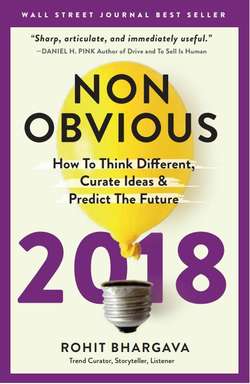Читать книгу Non-Obvious 2018 Edition - Рохит Бхаргава - Страница 72
На сайте Литреса книга снята с продажи.
Avoiding Future Babble
ОглавлениеNow that we have gone through the process for curating trends, I want to share a final caution: the dangerous potential for much of trend forecasting to sink into nonsense.
Despite my love of trends and belief that any of us can learn to curate them, the fact remains that we live in a world frustrated with predictions, and for good reason.
Economists fail to predict activities that lead to global recessions. Television meteorologists predict rain that never comes. And business trend forecasters are perhaps the worst offenders, sharing glassy-eyed predictions that seem either glaringly obvious or naively impossible.
In 2011 journalist Dan Gardner wrote about this mistake-ridden obsession with the future in his insightful book Future Babble. Gardner illuminated the many ways that so-called experts and pundits have led us down mistaken paths and caused more harm than good.
He builds his argument based on the widely known but rarely heeded research of psychologist Philip Tetlock, who spent more than twenty years interviewing all types of experts and collected of their 27,450 predictions and ideas about the future. Tetlock then analyzed these predictions against verifiable data and found that the experts’ predictions were no more accurate than random guesses.5
When Tetlock confronted some of these experts on how flawed their predictions had been, he found that the experts who had fared worst were the ones who struggled with uncertainty. These “hedgehogs,” as Tetlock describes them, were overconfident, described their mistaken predictions often as being “almost right,” and generally had an unchanging worldview.
“At least 50% of pundits seem wrong all the time.
It’s just hard to tell which 50%.”
Dan Gardner (from Future Babble)
On the other side were experts who didn’t follow a set path. They were comfortable with being uncertain and accepted that some of their predictions could be wrong. These experts are “foxes” and their defining characteristics included modesty about their ability to predict the future and a willingness to express doubt about their predictions.
How can you tell which predictions to trust and which to discount? And how can you improve the accuracy of your own predictions?
